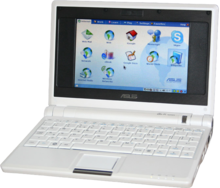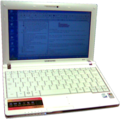Netbook: Difference between revisions
mNo edit summary |
→The term Netbook: There is no reason to conflate the editorial use of a term with a trademark battle. Keep the two separate, leave the details to the Psion article. |
||
| Line 29: | Line 29: | ||
Led by the popularization of small-form-factor laptops by [[Asus]] and then others, the term "netbook" has been used [[Genericized trademark|generically]] since early-mid 2008<ref>[http://www.google.com/trends?q=netbook&ctab=0&date=2008 Google Trends for 'netbook' in 2008]</ref><ref>http://www.engadget.com/2008/12/28/psion-says-its-only-going-after-those-profiting-from-the-term/</ref><ref>http://www.guardian.co.uk/technology/blog/2008/dec/24/psion-netbook-threats</ref> as an industry classification rather than a reference to a particular product. By April 2008, [[Intel]] had begun officially using the term netbook to recognize a specific sub-category of laptops.<ref name="intelblog">{{cite web | title = Thoughts on Netbooks | publisher = Intel.com, Paul Bergevin, March 03, 2008 | url = http://blogs.intel.com/technology/2008/03/thoughts_on_netbooks.php}}</ref><ref name="trusted">{{cite web | title = Intel Sets Out Netbook and Nettop Plans | publisher = Trustedreviews.com, Edward Chester, 4th Apr 2008 | url = ttp://www.trustedreviews.com/notebooks/news/2008/04/04/Intel-Sets-Out-Netbook-and-Nettop-Plans/p1 }}</ref> |
Led by the popularization of small-form-factor laptops by [[Asus]] and then others, the term "netbook" has been used [[Genericized trademark|generically]] since early-mid 2008<ref>[http://www.google.com/trends?q=netbook&ctab=0&date=2008 Google Trends for 'netbook' in 2008]</ref><ref>http://www.engadget.com/2008/12/28/psion-says-its-only-going-after-those-profiting-from-the-term/</ref><ref>http://www.guardian.co.uk/technology/blog/2008/dec/24/psion-netbook-threats</ref> as an industry classification rather than a reference to a particular product. By April 2008, [[Intel]] had begun officially using the term netbook to recognize a specific sub-category of laptops.<ref name="intelblog">{{cite web | title = Thoughts on Netbooks | publisher = Intel.com, Paul Bergevin, March 03, 2008 | url = http://blogs.intel.com/technology/2008/03/thoughts_on_netbooks.php}}</ref><ref name="trusted">{{cite web | title = Intel Sets Out Netbook and Nettop Plans | publisher = Trustedreviews.com, Edward Chester, 4th Apr 2008 | url = ttp://www.trustedreviews.com/notebooks/news/2008/04/04/Intel-Sets-Out-Netbook-and-Nettop-Plans/p1 }}</ref> |
||
The term ''Netbook'' is an industry descriptor for a class of notebooks — and is not a [[trademark]]. As such, the rules of trademarks to not apply to the use of the term in editorial context, rather only by specific business entities relative to specific products and services. Notably, [[Psion]] as well as others have used the term for specific products<ref>[http://www.prnewswire.co.uk/cgi/release?id=16302 Psion netbook news release]</ref>. |
|||
[[Psion]] have various trademarks for the term "Netbook"<ref>{{US trademark|75215401}}</ref><ref>{{Community trademark|000428250}}</ref> relating to their "netBook" series<ref>[http://www.prnewswire.co.uk/cgi/release?id=16302 Psion netbook news release]</ref> that was discontinued in November 2003<ref>[http://www.psionteklogix.com/public.aspx?s=us&p=EOLProducts Psio Discontinued Products]</ref><ref>[http://www.mtpt.co.uk/2008/12/a-netbook-by-any-other-name-or-how-psion-is-going-discover-you-have-to-use-it-or-lose-it.html A netbook by any other name, or how Psion is going discover you have to use it or lose it.]</ref>. Despite prior use of the term dating back to at least as far as 1989<ref>{{US trademark|74001501}}</ref> and having neither used the (now "probably generic"<ref>[http://patenthands.com/ph-blog/how-to-lose-a-trademark-netbook-is-probably-generic/#comment-17 How To Lose A Trademark: “Netbook” Is Probably Generic]</ref>) term nor enforced the trademark in over 5 years (after which time it can be considered abandoned for non-use) a batch of cease and desist letters were dispatched on [[23 December]], [[2008]].<ref>[http://jkontherun.com/2008/12/23/netbook-enthusiast-web-sites-getting-c-d-using-term-netbook/ Netbook enthusiast web sites getting C & D using term “netbook”]</ref><ref>[http://www.prnewswire.co.uk/cgi/release?id=16302 Psion Press Release]</ref><ref>[http://www.guardian.co.uk/technology/blog/2008/dec/24/psion-netbook-threats Psion threatens netbook sites over trademarks]</ref>. Similar applications by [[Micro-Star International|MSI]]<ref>{{US trademark|77580272}}</ref> and [[Coby Electronics Corporation|Coby Electronics]]<ref>{{US trademark|77590174}}</ref> have been recently rejected by the [[USPTO]] citing a "likelihood of confusion" under section 2(d). |
|||
:'' |
:''[[Psion#Psion and the term Netbook|Psion and the term Netbook]]'' |
||
== Hardware == |
== Hardware == |
||
Revision as of 22:00, 4 February 2009

Netbooks are light, compact, highly portable, inexpensive, and energy efficient laptops. Businessweek reported in late 2008 that netbooks represent a "greener" alternative to larger laptops "thanks to lower power demands, fewer toxic components, and a resource-efficient approach to computing."[1][2].
Many netbooks have solid-state drives and may rely on the Internet for remote access to web-based applications.[3] Increasingly they are targeted at cloud computing users who rely on servers and require a less powerful client computer.[4]
Netbooks have a wide range of light-weight operating systems including Linux and Windows XP[3] rather than more resource-intensive operating systems like Windows Vista as they have less processing power than traditional laptops.[5]
History
The current influx of small form factor laptops categorized as netbooks began in 2007 when Asus unveiled the Intel Celeron-based ASUS Eee PC, which had been designed originally for emerging markets.[6] The 8.9 × 6.5 in (23 x 17 cm) device weighed about two pounds and featured a 7-inch display, a keyboard approximately 85% the size of a normal keyboard, a custom version of Linux and the ability to run alternate operating systems.[7] Following the EeePC, Everex launched its CloudBook in mid February 2008, MSI released the Wind, Dell and HP both released "Mini" series (the Inspiron Mini and HP Mini) and others soon followed suit.
By late 2008, Netbooks had begun to take market share away from laptops[8] and overtook iPhone sales by 900,000 units in Q3.[9] It is estimated that almost thirty times more netbooks were sold in 2008 (11.4 million, 70% of which were in Europe[10]) than in 2007 (400,000),[11] and for 2009 sales are expected to grow a further 189% to 21.5 million[11]. Sales are projected to increase up to 50 million by the year 2012.[12] The trend is being driven by cloud computing and 3G adoption as well as the economic downturn and netbooks are evolving into "super-portable laptops for professionals".[13]
In early January 2009, two companies introduced ARM architecture based models, indicating a shift from the Intel Atom processor.[14][15]
Antecedents
The roots of the netbook can be traced to Nicholas Negroponte and the One Laptop Per Child (OLPC) project,[16][6] as well as the development and failed launch of the Palm Foleo by Jeff Hawkins, cofounder of Palm Computing. The Folio presaged the netbook as a light, small, computer and the concept of mobile computing tied to the internet and connected servers.[16]
As well, the netbook follows the concept of the NetPC,[17] conceived by Oracle CEO Larry Ellison. The NetPC was designed to make unnecessary the purchase of ever-more-powerful PCs, instead allowing the user to employ low-powered terminal-style PCs, lacking disk drives and relying heavily on the Internet and connected servers for their success.[17]
The term Netbook
Led by the popularization of small-form-factor laptops by Asus and then others, the term "netbook" has been used generically since early-mid 2008[18][19][20] as an industry classification rather than a reference to a particular product. By April 2008, Intel had begun officially using the term netbook to recognize a specific sub-category of laptops.[21][7]
The term Netbook is an industry descriptor for a class of notebooks — and is not a trademark. As such, the rules of trademarks to not apply to the use of the term in editorial context, rather only by specific business entities relative to specific products and services. Notably, Psion as well as others have used the term for specific products[22].
Hardware
While specifications and features of netbooks continue to evolve (for example with the introduction of 12-inch screens and ARM processors), one report at the end of 2008 suggested the typical netbook featured a 3-lb (1.4 kg) weight, a 9-inch (23 cm) screen, wireless Internet connectivity, Linux or Windows XP, an Intel chip, and a cost of less than US$400.[23]
Netbooks may also forgo a hard disk drive[24] or optical disc drive, instead favoring solid state storage devices such as internal solid-state hard drives and SD cards for their low power consumption, weight, and high durability. All netbooks on the market today feature Wi-Fi wireless networking and many also feature mobile data capabilities such as 3G.
Software
Netbooks typical employ as their operating system either Microsoft Windows XP or a netbook-specific variation of Linux, for example Ubuntu. Roughly 25-35% of netbooks employ a form of Linux. Microsoft estimates 70% of netbooks employ Windows XP.[25]).
Microsoft has extended the availability of Windows XP for ultra-low cost personal computers from June 2008 until June 2010,[26] possibly to keep netbooks from gaining market share at the expense of desktops and "value" laptops[27] and to avoid increased use of Linux installations on netbooks.[28] Microsoft is also testing[29] and has demonstrated[30] a 'Starter' edition of Windows 7 for this class of devices[31] which is limited to running 3 applications[32].
Advanced users may install other operating systems (including other distributions of Linux, editions of Windows XP and Mac OSX) or application software, but users typically rely on cloud computing applications and services which are available via the Internet and require less powerful hardware on the local computer.[33]
Gallery
See also
- Comparison of netbooks
- Nettop, a desktop equivalent of the Netbook
- Operating systems
- Netbook Trends and Solid-State Technology Forecast (PDF). pricegrabber.com. p. 7. Retrieved 2009-01-28.
References
- ^ Why Netbooks Are Greener than Laptops
- ^ The Net Impact of Netbooks? It Depends on Who Uses Them for What
- ^ a b Netbook Trends and Solid-State Technology Forecast (PDF). pricegrabber.com. p. 7. Retrieved 2009-01-28.
- ^ "Disruptor: The 'netbook' revolution". Fortune Magazine, Michael Copeland, October 16, 2008.
- ^ "Cheap PCs Weigh on Microsoft". Business Technologies, The Wall Street Journal, December 8, 2008.
- ^ a b "Netbooks vs. Notebooks". PCMagazine.com, Tim Bajarin, September 12, 2008.
- ^ a b [ttp://www.trustedreviews.com/notebooks/news/2008/04/04/Intel-Sets-Out-Netbook-and-Nettop-Plans/p1 "Intel Sets Out Netbook and Nettop Plans"]. Trustedreviews.com, Edward Chester, 4th Apr 2008.
- ^ Ian Lamont (2008-10-04). ""Netbooks" Move Up In Notebook Rankings". Slashdot. Retrieved 2008-10-23.
- ^ NetBookBoards.com (2008-12-12). ""Netbook" Sales Overtake iPhone Sales". Retrieved 2008-12-10.
- ^ 70% of Netbook sales are in Europe
- ^ a b Analysis: Did Intel underestimate netbook success? Cite error: The named reference "ee2009-01-10" was defined multiple times with different content (see the help page).
- ^ Nicole Kobie (2008-08-12). "Netbook sales to top 50 million by 2012". PC Pro. Retrieved 2008-10-23.
- ^ Puny, Trendy Netbooks Are Growing Up to Suit Business Users
- ^ LimePC: $199 Freescale-powered netbook - Video
- ^ Pegatron showcases prototype $199 netbook
- ^ a b "Jeff Hawkins and the World's First Netbook". PCMagazine.com, Tim Bajarin, November 21, 2008.
- ^ a b "Beware the Netbook Hype Machine". PCMagazine.com, Lance Ulanoff, November 19, 2008.
- ^ Google Trends for 'netbook' in 2008
- ^ http://www.engadget.com/2008/12/28/psion-says-its-only-going-after-those-profiting-from-the-term/
- ^ http://www.guardian.co.uk/technology/blog/2008/dec/24/psion-netbook-threats
- ^ "Thoughts on Netbooks". Intel.com, Paul Bergevin, March 03, 2008.
- ^ Psion netbook news release
- ^ Cite error: The named reference
fortunewas invoked but never defined (see the help page). - ^ What is a Netbook computer?
- ^ Microsoft Missing Netbook Growth as Linux Wins Sales (Update2)
- ^ Microsoft Announces Extended Availability of Windows XP Home for ULCPCs, April 3, 2008 Press release
- ^ Microsoft to limit capabilities of cheap laptops, IT World May 12, 2008
- ^ Microsoft U-turn to stop Linux dominating ultra low cost PC
- ^ Microsoft seeking Win 7 testers for netbooks?
- ^ Ars@PDC: Steven Sinofsky on Windows 7 and netbooks
- ^ Confirmed: Windows 7 'netbook edition'
- ^ Windows 7 to Ship In Six Different Versions
- ^ Shoot For the Clouds
External links
- The rise of the Netbook
- Netbooks hit right spot for schoolchildren
- The State of the Netbook, Part I: WEee have lived before
- How to buy a mini laptop or netbook - At TheMiniLaptop.







